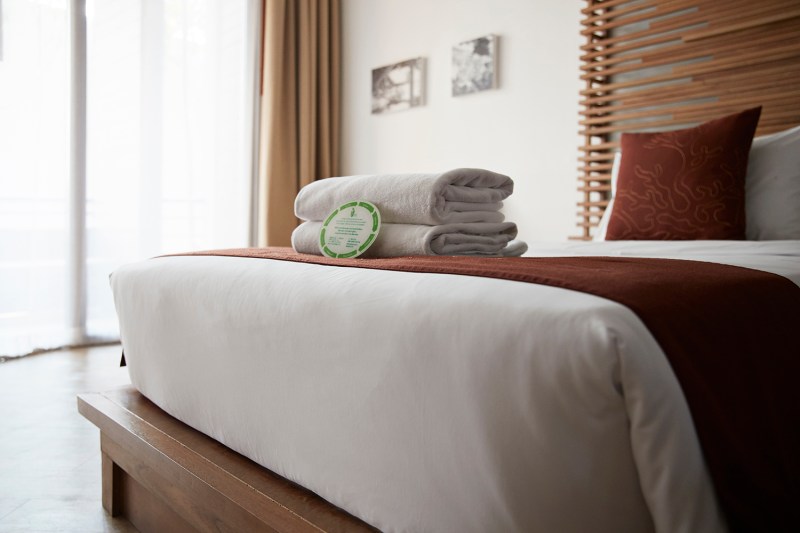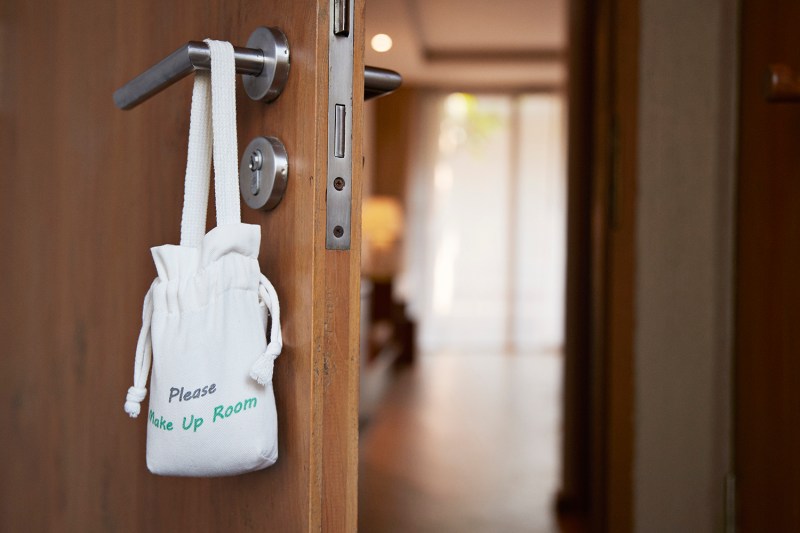
From carbon offsets to those cool keycard holders that make sure the lights in your hotel room turn off when you leave, the travel industry has been reevaluating its environmental impact in recent years, taking steps toward more sustainable and eco-friendly practices. And one of the areas where this switch is most apparent and publicized is where you start and end each day of your vacation (and maybe spend all your time if it’s one of those lie-around-and-do-nothing trips): your hotel.
Related Guides
- How to Prepare for and Stay Safe at a Hotel Right Now
- How Do Hotel Star Ratings Actually Work?
- Should You Travel After Getting a COVID-19 Vaccine?
Throughout the hospitality industry, everyone from smaller boutique properties to massive global chains has been switching to more sustainable operating and business models. These changes have largely been in the form of eliminating that most universal embodiment of hotel amenities, single-use plastic bottles for things like shampoo and soap, and reducing water usage. Some hotels are also being savvier with energy usage, like using LED light bulbs and taking steps to gain environmental certifications like the Leadership in Energy and Environmental Design (LEED) certification from the US Green Building Council.
But then the pandemic hit. For health and safety reasons and to make guests feel safe and comfortable, many hotels that remained open brought back or upped the usage of disposable single-use plastics, including for cutlery and dining. There was widespread concern that freshly taken steps toward turning the hospitality industry “green” would start back at zero.
But in some ways, the pandemic offered hotels, who suddenly had no guests to take care of, a break to assess their strengths and weaknesses and make necessary changes to upgrade their sustainability initiatives.
In February 2021, the Center for Hospitality Research at Cornell’s renowned School of Hotel Administration held the 11th Sustainability Roundtable, which looks into sustainability in the hospitality industry over the past year. In reviewing 2020, their primary focus was how COVID-19 had impacted sustainability in hospitality.
Among their findings, they discovered that despite the pandemic, some strides in sustainability were made over the past year, such as increases in touchless technology. Innovations in this field were already in motion before the pandemic, such as with the Hilton Honors app which allowed for keycard-less digital entry into your room. But the pandemic boosted the necessity of being able to do things while having limited contact with other people, and many hotels implemented remote, contactless check-in, room entry, and even food or amenities access. A cell phone could suddenly replace the front desk clerk. Among its benefits, touchless tech is more energy-efficient and can eliminate the need for paper or the increased usage of non-ecofriendly cleaners.
The study also found that, due to the lack of guests, there was a decline in the use of chemicals from cleaners and a reduction in carbon emissions. With no guests staying in hotels, there’s no need to keep the lights on or the AC flowing.

However, the study also discovered that in some areas, sustainability in hospitality took a step back. This included a “dramatic increase in the use of disposable utensils, packaging, etc.”, that some sustainability initiatives were canceled or put on hold, and that “stronger, more toxic” chemicals were being used for cleaning and sanitizing. And, in the case of the lower energy usage, it’s a hollow victory, as that was only because there were no people to use up energy.
With their use of harmful chemicals, cleaning and sanitizing products are major environmental offenders. Some hotels, though, took the pandemic as an opportunity to switch to more eco-friendly cleaning options. Marriott, for example, rolled out EPA-approved electrostatic sprayers like those used on airplanes to safely disinfect rooms and other large areas, as well as UV light technology to clean keys and other items.
Other hotels saw an opportunity to recommit and improve on previous pledges to reduce their ecological impact. In 2018, Hilton announced a whole host of environmental and social responsibility goals as part of its Travel with Purpose 2030 Goals. These included setting carbon reduction goals in line with the Paris Climate Accord, reducing water use by half, sending no leftover soap to landfills, and overall cutting its environmental impact in half by 2030. In 2019, they also announced cutbacks to single-use plastics, including completely eliminating straws.
Despite the obstacles of the pandemic, Hilton reaffirmed its commitment to this massive initiative. They then closed out 2020 by being named the global leader in sustainability for the “Hotels, Resorts, & Cruise Line” category by the Dow Jones Sustainability Indices for the second year in a row.
Hilton reported significant drops in energy, water, and waste usage during 2020, as part of overall downward trends. The biggest contributor factor in the decrease, though, was the lack of guests or hotels being closed. However, that lack of guests allowed Hilton to start implementing other parts of their impact reduction plan, like having some of their hotels switch to using renewable energy.
So now, as guests prepare to return to hotels, the big challenge is how do hotels maintain those sustainability measures. But there is one big reason they’ll want to keep sustainability as a top priority: Their guests. Sustainability and eco-friendliness are more important for travelers and hotel guests than ever.

Studies and research carried out by Booking.com found that over half of global travelers want to “travel more sustainably in the future,” and their 2019 Sustainable Travel Report highlighted that 70% of travelers are more likely to choose and book accommodations that are eco-friendly.
Although current practices like using non-eco-friendly cleaning products and getting rid of unwanted waste may be cost-effective and save hotels money now, these and other findings show that travelers are willing to pay for hotels that go the extra mile for the planet, which will earn hotels loyalty. That makes it imperative that sustainability measures are about actual change and growth instead of promotion and good PR.
Travelers and the companies that cater to them had a much-needed break over the past year to evaluate their priorities. Travelers are making it clear how important sustainability in travel is for them. In response, the hospitality industry has made some big promises about moving forward in a more sustainable, eco-friendly manner. As the world returns to normal, we’ll see if those single-use shampoo bottles stay or go.



